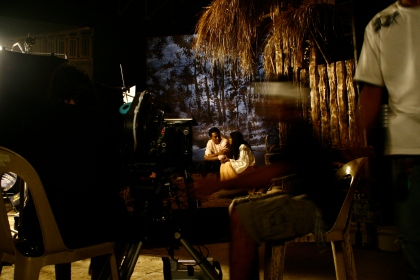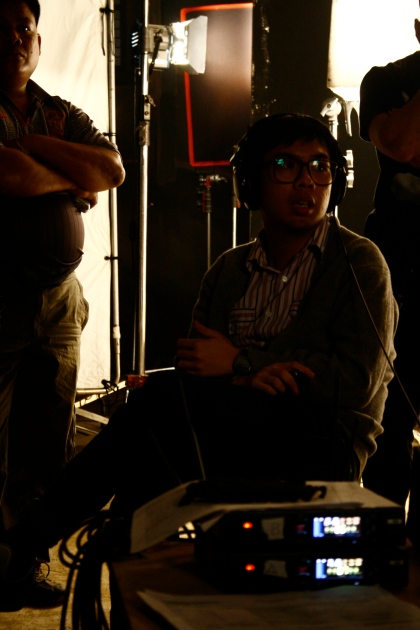Filed under: Updates
A blog for the series of screenings held in the book shop Fully Booked, in Fort Bonifacio, Taguig: http://fullybookedfilmseries.wordpress.com/
Have a look and if you are or will be in Manila, please come. Screenings updates will be posted there, as well as notes on past screenings (introduction by the filmmakers, or links to relevant info).
(1)

(2)

(3)

(4)

(5)

—
Images from the set of Raya Martin’s Independencia, Monday December 15. Shooting day number 8 of a 15 day straight shooting schedule. While I preserved the color of the images I took, the film is being shot in black and white.
Independencia is the second part of a trilogy that began with Maicling Pelicula Nang Ysang Indio Nacional (O Ang Mahabang Kalungkutan ng Katagalugan) (A Short Film About the Indio Nacional (Or the Prolonged Sorrow of the Filipinos, 2005) and takes place during major periods of struggle in Philippine history. It continues the aesthetic design for the trilogy started by Indio Nacional, which is for each film to mimmick the cinematic style of the era and culture it depicts. For Indio Nacional which took place at the end of the Spanish occupation of the Philippines, that meant shooting in the vain of the silent-film, with a static camera, intertitles, and simple animation, for Independencia, set during the American occupation, it means shooting entirely in a studio, utilizing artificial backdrops, and applying heavy make-up on the actors. Seen in the images above is one of painted backdrops for the film. There are between fifteen and twenty of them in all.
Cinematographer for the film, being shot on black and white 35mm stock, is Jeanne Lapoire, who has worked with the likes of Francos Ozon, André Téchiné and Pedro Costa (for the Straub film), among others. Her full credits can be viewed here.
The actors in the images above are Sid Lucero and Alessandra De Rossi.
The film is to be edited by Lav Diaz.
[Update April 26, 2009: Lav Diaz was no longer the final editor of the film. The credit belongs to Jay Halili]
* outtake after the cut
Filed under: Updates | Tags: apichatpong weerasethakul, singapore international film festival, syndromes and a century
Two attempts at censorship in Southeast Asia: one directly (a film), another indirectly (a festival).
(1)
In Thailand, following a protracted fight against the censorship of his film Syndromes and a Century, Apichatpong Weerasethakul relents and agrees to the demanded cuts, but not without making his disgust heard: the excised scenes will be replaced by silent scratched black leader. This will total 15 minutes of the films 105 minute running time.
Apichatpong:
“It’s cynical, but actually it’s a statement for the audience to make them aware that they are being blinded from getting information in this society,”
“Maybe there will be a small group of people who want to see my film, and this is the version they can see through the system,”
Syndromes producer Keith Griffith explains in Filmmaker magazine.
Bangkok’s new freesheet Daily Xpress reports.
*thanks to Wise Kwai
(2)
In Singapore the government, despite seeming abundance, continues to provide peanut-sized funding to the most important film festival in Southeast Asia, the Singapore International Film Festival, now on its 21st year.
Tan Pin Pin, director of the much lauded Singapore Gaga and Invisible City, was among a group of 25 respected members of the film community that attempted to rally support for the festival by writing a letter to the Singapore Film Commission and Media Development Authority late last year. Their words and request for a meeting fell on deaf ears.
Pin Pin:
Last year, SIFF’s finances were in dire straits and whether it could make it to the 21st edition was in doubt. When we knew SIFF was having difficulty fundraising, a group of us media professionals came together to help. One of the initiatives was to write a letter to the Singapore Film Commission (SFC) and the Media Development Authority (MDA) to persuade them to increase the funding for SIFF.
Our letter didn’t have much of an effect. Our request to meet them was alas not taken up because it “was not necessary”. The SFC/MDA has made very clear that it is not interested in an independently curated film festival like SIFF. For the 2008 edition, the Singapore Film Commission (SFC) gave SIFF $65,000 (US$40,000).
The show goes on as scheduled, April 4-14, but the festival remains in a difficult position financially. Pin Pin posts the letter, complete with notes from those who signed, and provides an address where monetary support for SIFF may be sent on her blog.
Update: April 9, 2008
Kong Rithdee writes about the release of Syndromes in an April 4 article for the Bangkok Post. Excerpts:
The film will be shown twice a day at Paragon Cineplex for two weeks, starting next Thursday. With every ticket purchased, the audience will receive a limited edition set of postcards bearing still photos of the censored scenes.
Along with the surprise release of this highly-praised Thai movie, which is as fascinating for its odd style as the ruckus that has built up around it, the Thai Film Foundation will organise an exhibition entitled “History of Thai Censorhip” in the theatre hall. Partly a chronicle of Saeng Satawat’s turbulent journey from its world premiere in Venice in September 2006 to the release of the cut version in its homeland 19 months later (see box), the exhibit will also trace the history of movie censorship in Thailand and its connection to the country’s politics since the time of King Rama VII.
“I would like the public to become aware of the problem of censorship and to stimulate a discussion in society,” says Apichatpong. “Even though the Film Act of 1930 has been replaced by a new one, passed last December, the new law, which introduced a rating system, still permits censorship and the provision to ban a movie. That is not an improvement to people’s freedom of expression.”
[…]
“I’d like the audience to feel that they’re forced to be in the dark, while the scratches signify an agent of destruction,” he says. “If censorship is still with us, then maybe this is how we should watch the movies.”
[…]
Chalida Uabumrungjit of Thai Film Foundation, organiser of the screening and exhibition, says she’s aware of the tricky process of promoting the release of this much-awaited film and at the same time informing the public that it’s a censored edition.
“To show this movie in a big downtown theatre is a statement,” she says. “And I believe that to choose to watch it is also a form of statement from the viewers.” In the exhibit, visitors can revisit the first incident of film censorship in pre-constitution Siam, when Amnad Mued (Dark Power) was originally banned for featuring scenes of a criminal den, but was later allowed to screen by King Rama VII.
The polarised attitudes for and against censorship, Chalida says, have been a constant since the time of the original Film Act in 1930. Back then, there was even a poster campaign condemning cinema as a “lesson on how to become a crook”, with reference to crime movies of the day. But there was also the argument, as posited in a letter to a journal, that “cinema is also a lesson for policemen – on how to catch a crook.”
Filed under: Updates
Since the last update, Tarantino has come and gone (and is apparently a big fan of Quark Henares’ Keka), Raya Martin’s Autohystoria took the Grand Prize in Cinemanila’s Digitak Lokal competition with John Torres’ Voices… receiving the Jury Prize, Lav Diaz’s Death in the Land of Encantos received a Special Mention in the Orizzonti Documentary section of the Venice Film Festival, and the local Urian awards given out (list of winners and comments on that follow), and I’ve been on all-too-brief trips to Singapore and Bangkok. Ah, so much to discuss!
But also so busy.
So in lieu of a proper update allow me to plug a book compiled and published by Malaysian writer and filmmaker Amir Muhammad (blog link on the left) that I had the pleasure of picking up: Malaysian Politians Say the Darndest Things. An brief interview with Amir about the book can be found here. And the book itself may be purchased online here.
To quote Malaysian Politicians… (a book of quotes whose introduction begins with a quote about quotes):
“It is a good thing for an uneducated man to read books of quotations.”
– Winston Churchill, as quoted by K. Das
